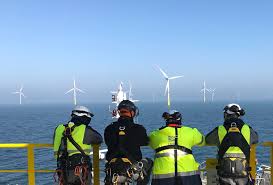Offshore Wind Training Course
Offshore Wind Training Course is designed to equip professionals with the technical, environmental, and operational expertise required to thrive in the rapidly expanding offshore wind energy industry.
Skills Covered

Course Overview
Offshore Wind Training Course
Introduction
Offshore Wind Training Course is designed to equip professionals with the technical, environmental, and operational expertise required to thrive in the rapidly expanding offshore wind energy industry. As the world transitions to cleaner energy solutions, offshore wind farms have become a cornerstone of renewable energy strategies globally. This intensive course provides practical knowledge and cutting-edge strategies in wind turbine technology, installation, maintenance, safety regulations, and marine logistics. Participants will gain critical insights into global offshore wind markets, risk management, and innovative financing models.
This training is ideal for engineers, project managers, policymakers, and investors seeking to advance their careers in the offshore wind sector. With a focus on sustainability, decarbonization, and digital transformation, the course offers in-depth case studies, hands-on simulations, and access to industry-standard tools. Participants will leave equipped to contribute meaningfully to the green energy transition and ensure efficient offshore wind deployment from design to decommissioning.
Course Objectives
- Understand the fundamentals of offshore wind energy systems and infrastructure.
- Analyze wind resource assessment and site selection techniques.
- Explore floating wind turbine technology and fixed-bottom systems.
- Learn the principles of marine logistics and project management.
- Master grid integration and power transmission challenges.
- Apply risk assessment and mitigation strategies in offshore environments.
- Examine environmental impact assessments and marine ecology.
- Interpret offshore wind regulations and safety standards.
- Assess supply chain and procurement for offshore wind components.
- Study finance models and investment strategies for offshore wind.
- Integrate digital twin and data analytics in wind farm optimization.
- Review maintenance strategies including condition monitoring.
- Explore future trends in green hydrogen integration with offshore wind.
Target Audience
- Renewable energy engineers
- Environmental scientists and consultants
- Offshore wind project managers
- Maritime and marine engineers
- Energy policy advisors
- Investment and finance professionals
- Technicians and field operators
- Graduate students in energy and sustainability fields
Course Duration: 5 days
Course Modules
Module 1: Offshore Wind Energy Fundamentals
- Introduction to offshore wind systems
- Global offshore wind markets
- Wind turbine components and operations
- Energy yield calculation and wind behavior
- Environmental and economic benefits
- Case Study: Hornsea Project One – UK's offshore wind giant
Module 2: Site Assessment & Wind Resource Analysis
- Geospatial mapping tools and wind data
- Site feasibility and zoning
- Wind measurement equipment (LiDAR/SODAR)
- Bathymetry and seabed analysis
- Climate risk factors and wind patterns
- Case Study: Site selection for Vineyard Wind, USA
Module 3: Offshore Wind Technology and Infrastructure
- Fixed-bottom vs. floating wind systems
- Foundation design and material science
- Turbine scalability and megawatt trends
- Subsea cabling and electrical systems
- Innovations in offshore wind hardware
- Case Study: Hywind Scotland – floating wind farm success
Module 4: Marine Logistics and Project Execution
- Installation vessels and jack-up rigs
- Port logistics and marine coordination
- Project timelines and budgeting
- Weather window management
- Supply chain coordination
- Case Study: Baltic Eagle Wind Farm logistics challenge
Module 5: Regulatory, Legal, and Environmental Aspects
- Marine spatial planning and permitting
- Safety codes and international regulations
- Impact on marine biodiversity
- Noise, emissions, and habitat mitigation
- Community and stakeholder engagement
- Case Study: Germany’s BSH regulatory model
Module 6: Operations, Maintenance & Decommissioning
- Inspection protocols and maintenance scheduling
- Condition monitoring technologies
- Remote and autonomous monitoring
- Health and safety at sea
- End-of-life planning and recycling
- Case Study: Offshore maintenance at Block Island Wind Farm
Module 7: Digitalization and Innovation in Offshore Wind
- Use of drones, IoT, and sensors
- AI and machine learning in performance tracking
- Predictive analytics for downtime reduction
- Cybersecurity in wind operations
- Role of digital twins in asset management
- Case Study: Digital twin deployment in Dogger Bank project
Module 8: Financing, Risk Management, and Future Outlook
- CAPEX/OPEX modeling
- Insurance and warranty provisions
- PPA agreements and carbon credits
- Risk allocation and mitigation
- Offshore wind to hydrogen potential
- Case Study: Japan’s offshore wind and green hydrogen roadmap
Training Methodology
- Instructor-led presentations
- Hands-on simulation and modeling
- Group-based case study discussions
- Real-world scenario analysis
- Access to digital platforms and project tools
- Interactive Q&A and expert panels
Register as a group from 3 participants for a Discount
Send us an email: info@datastatresearch.org or call +254724527104
Certification
Upon successful completion of this training, participants will be issued with a globally- recognized certificate.
Tailor-Made Course
We also offer tailor-made courses based on your needs.
Key Notes
a. The participant must be conversant with English.
b. Upon completion of training the participant will be issued with an Authorized Training Certificate
c. Course duration is flexible and the contents can be modified to fit any number of days.
d. The course fee includes facilitation training materials, 2 coffee breaks, buffet lunch and A Certificate upon successful completion of Training.
e. One-year post-training support Consultation and Coaching provided after the course.
f. Payment should be done at least a week before commence of the training, to DATASTAT CONSULTANCY LTD account, as indicated in the invoice so as to enable us prepare better for you.